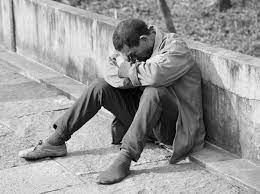Some people think that being poor is simple. You don’t have enough money to buy many things, so you have to buy less. But that’s not really how it works. When you’re broke, you can’t do all the little things that will improve your budget in the long run. In fact, it costs more to be poor.
When you’re poor, you can’t buy your food in bulk, buy high quality products that will last, or own your own technology instead of renting it. It costs money up front to save money in the long run. Worse still, poverty often comes with hidden and intangible costs that make it even harder to get out of poverty.
Food may be cheap, but eating healthy is expensive.
As any student can tell you, getting food when you are poor is not that difficult. Ramen costs less than 20 cents a packet. The problem is finding healthy food. Ramen is 20% empty calories and 80% salt. If you ate only that at every meal for years, your long-term health would be seriously threatened (at least that’s what my doctor tells me).
This is exactly the situation I was in when I was broke. Time was more precious than my health, and fast food was easier than cooking at home. It wasn’t much more expensive either. This led to an unhealthy hierarchy of meals: on good weeks, I could buy hot dogs at my local QuikTrip for $2. On bad weeks, it was Ramen for days. Two-liter bottles of soda were cheaper than orange juice or milk, so if I wanted to drink something other than water, that’s what I got.
Now, a few years of this diet will be bad enough. The long-term consequences were worse. Even when I started making more money, the habits remained. Soda is still a staple in my diet. It took me a long time to get into the habit of preparing good meals at home. It’s easy to think that you’ll change your habits once you have more money, but you don’t realise how many bad habits you’re forming.
It’s hard to escape this trap. According to a Harvard School of Public Health study, healthy meals cost on average $1.50 more per day (or ~$45 per month) than unhealthy meals. When you have money, this is not a big deal. However, if you earn the federal minimum wage of $7.25 an hour and work 40 hours a week, that’s about 3.6% of your annual salary. If you can only get 32 hours a week part-time (which is more common for minimum wage jobs), that’s 4.5% of your annual salary. Before tax, by the way.
When $1.50 a day can be almost 5% of your annual salary, it’s not surprising that you would choose the $1 soda over the $4 orange juice. Who cares about “long-term health consequences” when you can barely pay your rent? You know what has serious “long-term health consequences”? Getting evicted. I’ll pay the rent today and worry about heart disease later.
When you’re poor, you can’t afford to think about the “long term.” I knew it made sense to buy things at the big membership shops, but I couldn’t even get past the membership fee. I knew that eating gas station hot dogs and ramen was going to kill me one day, but as long as that day didn’t come before the rent was paid, I had to make do. I probably could have done a little better if I had planned to cook more meals in advance, but like 6.8 million Americans according to the Bureau of Labor Statistics, I had to work multiple jobs to get by. I didn’t have enough time to be healthy, and I didn’t have enough money to save.
Cheap cars cost more to repair, and public transport is a waste of time
Having a job doesn’t mean much if you can’t get to your job. Owning a car is expensive, even after paying off the initial cost. Public transport may be more suitable for people on low incomes, but it is not always available in all cities.
Transport has two important hidden costs when you are poor. Firstly, many expensive car repairs can be avoided… if you have the money to do them in the first place. I used to ignore changing my brake pads for months. My car would start to make that familiar squeaking noise that indicated it wasn’t long before the brake pads were worn out. I hated the sound, but I hated being overdrawn on my account even more. So I turned the stereo up a bit and tried to drive less.
Brake pad replacement can cost an average of $145, depending on your car. If I had to spend $145 to change my brake pads (assuming I had that kind of money in my account), at best I’d wipe out my food budget for the month. At worst, I wouldn’t have enough money to pay the utilities. So I’d put it off.
On at least one occasion, my brakes were so bad they were wearing out the rotors. In case it never happened to you, the squealing rotors make a terrible metal-on-metal noise. Replacing a rotor also costs hundreds of dollars more than replacing the brake pads. Sure, I managed to put off an expense, but when the rotors broke, I was screwed. The longer I waited to do basic maintenance, the more expensive the repairs became.
But waiting was often my only option. Unlike buying healthy food, there were times when I literally had no money. Not “I have this money, but I shouldn’t spend it”. Rather: the car repair costs $145 and I have $12 in my account. And I still have to drive my car to work. There is no third option.
Public transportation is a great option, but many cities don’t offer it. If yours does, it’s still not great. With public transport, you have to deal with a very different cost: time. What would be a fifteen minute journey by car becomes an hour-long journey by bus. If you miss a bus, you lose another 10 to 15 minutes. When you only have a few hours to spare during the day, that hour on the bus can prevent you from preparing a decent meal or doing the laundry. This can also apply to cars (“I’ll do that one-hour oil change next week”), but with public transport, the time cost adds up quickly.
Unfortunately, transport is not really optional. If your car breaks down and you don’t have the money to fix it, you lose extra pay. Some people even lose their jobs. The time cost of public transport can also make it harder to do things that help you get out of poverty, like education. Ironically, just getting to work can make it harder to work, if you can’t afford all the associated costs.
You need to dress well to grow, but new clothes are not a priority.
Despite their necessity, buying new clothes is often seen as one of the most stereotypical frivolous purchases. Why should poor people buy new clothes or nice clothes when they are struggling to make ends meet, right? The problem is that if you don’t spend money on clothes, you pay a heavy social price.
Many years ago I worked for Walmart. Like most retail employees, I had to buy my own uniform. At the time, we had to wear dark blue shirts and khaki trousers. I didn’t have either, so I had to spend my entire clothing budget to get ready for work (even before I got my first paycheck). The problem was that I was working outside as a cart pusher. Navy blue shirts tend to fade in the harsh Georgia sun. Also, my shoes were wearing out every three months from walking on the pavement all day. And not just “they look ratty” – my toes were literally touching the hot pavement within months of getting new shoes.
Needless to say, I looked like crap most of the time. My shirts were faded and my shoes were falling apart, and this while I was on duty. The rest of my wardrobe was even worse. Whatever money I could spend on clothes usually had to be spent on new uniforms. The problem was that if I wanted to get a job elsewhere, the nicest thing I had to wear was my work clothes. It took a while before I could afford to update my wardrobe with something remotely presentable while keeping up with the uniforms. In the end, I only managed to do this by opening a small line of credit with a clothing retailer. No matter how many people advised me against borrowing money when I was broke, I simply could not afford the clothes I needed to look presentable to an employer before I got the job I was applying for.
Dressing well is a tricky situation. If you are poor and have a nice wardrobe, people think you are irresponsible with money. On the other hand, if you are badly dressed, you risk being judged badly, especially at job interviews. The way you dress can mean the difference between getting the job and being passed over as soon as you walk through the door. This type of effect is so strong that simply wearing a recognisable brand can improve the way others perceive you. It’s sad, but that’s the world we live in.
Of course, the cost of clothing doesn’t stop at social pressures. Just keeping your clothes clean and presentable can also cost you time and money. If you don’t own or have access to a washing machine and tumble dryer, you have to spend time in a launderette. Not only does this cost money every time you clean your clothes, it takes up valuable time that could be better spent working, learning a skill or looking after your family.
The worst part is that it all seems frivolous. Frankly, it’s demoralising. As someone who has had to wear shitty clothes to work and even shabbier clothes on my days off, I know what it’s like to be seen differently. You are told you need new clothes. You are reminded, politely and unhelpfully, that your clothes are faded. It is vaguely suggested that your inability to buy new shoes is not a symptom of your low salary, but of laziness. Why haven’t you gone to the shop to buy new shoes yet? As if going to the shop is the biggest obstacle.
Yet it always feels like worrying about your appearance is vanity, rather than practicality. Food is practical. Housing is practical. Transportation is practical. New clothes? Why do you waste your money on new clothes, only to complain that you’re broke? Fortunately, you can at least ignore this mindset. You can’t change people’s perception if you wear old clothes, but you can at least ignore people who blame you for “wasting” money. You know, provided you can scrape together enough money to find clothes to start with.
Fees for everything can add up and ruin your budget
Avoiding costs is a matter of life and death for low-income households. This is a special category, because when you are poor, fees are everywhere. Fees for having a bank. Fees for not having a bank. Fees for paying late. Fees for paying with a certain type of card. Fees for not being able to pay a tax. A person can drown in the various fees that disproportionately hit poor families.
One of the fees that has hurt me the most over the years is the overdraft fee. If I charged something to my debit card and then it turned out I didn’t have enough money, I was charged $35 per transaction. Seems like a no-brainer, right? Don’t spend money you don’t have, Eric!
Except that’s not how it works when you’re broke. You have to obsessively analyse every transaction on your account. Not just how much, but when. If you pay the electricity bill today, but it’s not paid until next week, you have to remember that your account is much emptier than it looks. My credit union, in particular, had terrible software. Its website looked like it hadn’t been updated since the 1990s (and still isn’t). There was absolutely no tool for tracking funds allocated to different uses. The “Available Balance” box tried to show how much unspent money I actually had, but it was unreliable. The best I could do was to keep a written diary of every transaction personally, but if I forgot something or made a mistake in my calculations, I was screwed.
It was even worse when my credit union applied transactions in order from highest to lowest, rather than chronologically. Let’s say I had $150 in my account and accidentally spent $160. One transaction was a $150 electricity bill, while the rest were four transactions of $2.50 each. Even though the electricity bill was the last one I paid, I would sometimes find that it was removed from my account first, leaving me with zero dollars. Then each $2.50 transaction would cost me another $35 in overdraft fees. If they had been done in the right order, I would have had only one fee, but instead I had to pay $140 in fees. Unfortunately, this happens much more often than it should. Sometimes it was my own fault, but it also happened when deposits didn’t clear when due or invoices were billed earlier than their due date. A minor mistake by someone with more money destroyed my budget for weeks.
Banks aren’t the only ones who charge compounding fees. Every year I had to pay to register my car. One particularly bad year I had no money to pay for the registration. I was also working a mile away from my workplace, so when it came down to a choice between registration and food, I took the risk of getting to work without getting arrested. A week after my registration was due, I was arrested. I was let off with a warning and told to pay my registration. A week later (before I had even earned enough money to pay my registration), I was arrested again. As this was the second time for the same offence, I received a ticket for almost $100. This did not make it easy to pay the fine. In the end, I was able to pay it with the money I received from my relatives at Christmas. Just what I always wanted.
Fees are everywhere when you’re poor. Banks can charge a ton of fees for using basic services like checks. A simple traffic ticket can get out of hand, even leading to arrest and additional fees. Utilities can charge fees if you pay by debit card. If you cannot get authorisation from a bank, payment systems such as payment cards may charge you a fee just to use your money. All these fees add up to huge pains that are much worse when you have no money. Not paying these fees only leads to more fees, which means that, as in most areas of life, being poor costs more.
With all these things, there is an element of responsibility. For example, could I have walked to work instead of driving a car with an expired tag? Maybe! But I tried for a while, got caught in the rain and my phone was destroyed. At the time, I was trying to break into Android writing, and this choice to save money could have derailed my entire career.
That’s what makes being poor so hard. Sure, you can make choices that lighten your load, but the margin for error is much smaller. At the same time, the amount of extra work you have to do just to break even is much higher. You could spend dozens of hours every week trying to optimise every penny of your budget, only for one mistake to ruin you for a month.
This is just my experience, but many people have been in much worse situations than I was. When I was at my lowest ebb, I was lucky to have people to help me or to get a windfall when I needed it. Others are not so lucky. When the punishment for a mistake or an accident is so severe, it is almost impossible, even for the hardest working people, to break out of the cycle of poverty.










